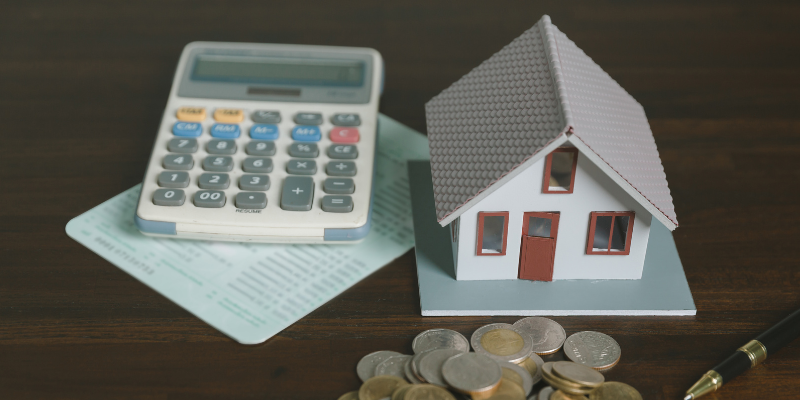
Fort Worth, TX Capital Gains Tax Calculator
Selling your Fort Worth property for more than you paid? Nice. That profit feels great until tax season rolls around and you realize the IRS has been eyeing your money the whole time.
Capital gains tax is one of those things people don’t think about until they’re sitting at the closing table. Lucky for you, Texas makes this easier than most states! No extra state taxes are piling on, and there are plenty of ways to cut down what you owe if you plan.
Let’s talk about how this whole capital gains thing works and how to use calculators that’ll give you real numbers instead of guesses!
What Is Capital Gains Tax?
Capital gains tax is the tax the government takes when you sell property for a profit. You bought your house for $200,000 and sold it for $300,000; that $100,000 difference is what gets taxed.
The thing is, you don’t owe a dime until you actually sell and take the money. Just owning a property that’s gone up in value doesn’t trigger anything.
Short-Term vs. Long-Term Capital Gains
How long you’ve owned the place makes a big difference in what you’ll pay. If you own it for a year or less, you’re dealing with short-term rates. This is essentially the same as your regular income tax, and it can reach 37% if you’re earning a substantial income.
If you own it longer than a year, you drop down to long-term rates, which are way friendlier. It’s 0%, 15%, or 20% depending on your income. Most people in Fort Worth get the long-term deal since they’ve had their homes for years. However, if you bought and flipped fast, yeah, you’re stuck with the expensive option.
How Does Capital Gains Tax Work in Fort Worth, TX?
Fort Worth sellers have one significant advantage right from the start: Texas doesn’t have a state income tax, so there’s no state capital gains tax added on. You’re just dealing with the federal bill, and that’s it.
Federal Capital Gains Tax Rates
The rate you pay depends on your income and the length of time you have held the property. Most people end up at 15% for long-term gains. If you’re single, making under $48,350, or married filing jointly under $96,700, you actually pay zero.
High earners (individuals with incomes over $533,400 or couples with incomes over $600,050) pay a 20% tax rate. Short-term gains are taxed at your regular income tax bracket, which ranges from 10% to 37%.
Texas State Tax
Texas doesn’t charge a state capital gains tax because the state doesn’t impose an income tax at all. While people in California or New York are paying an extra 10% or more in taxes to their state, Fort Worth sellers don’t, allowing them to keep more of their profit.
Fort Worth, TX Real Estate Capital Gains Tax Calculator
Doing the math by hand sounds like a lot of work. Online calculators make this whole thing way easier. You just plug in your numbers and they tell you precisely what you’ll owe. Here are three solid ones that actually work.
SmartAsset Capital Gains Tax Calculator
SmartAsset’s Capital Gains Tax Calculator provides a comprehensive breakdown of federal, state, and local taxes. It’s pretty detailed and even shows you how much you’d save by holding the property longer. Super helpful if you’re trying to decide when to sell.
NerdWallet Capital Gains Tax Calculator
NerdWallet Capital Gains Tax Calculator walks you through everything step by step. You enter your purchase price, sale price, how long you owned it, your filing status, and your income, and then it spits out what you owe. It’s really straightforward, with nothing confusing about it.
Public Capital Gains Tax Calculator
The Public Capital Gains Tax Calculator is suitable for a wide range of investments, including real estate, stocks, and cryptocurrencies. It’s quick and provides a clear breakdown of your federal tax rate and what that means for your actual take-home pay. Perfect if you just want the answer fast without a lot of extra info.
How to Calculate Capital Gains Tax in Fort Worth, TX

If you want to do manual calculations, you’ve got to do it in the correct order or your numbers will be totally off. Here’s how:
Step 1: Determine Your Tax Basis
Your basis is basically what you paid for the property, plus any significant improvements you made. So if you bought your house for $250,000 and then dropped $40,000 on a new roof and kitchen remodel, your basis is $290,000.
You can also include closing costs from when you purchased it and real estate commissions from when you sell. All that stuff bumps up your basis, which is beneficial because a higher basis means a smaller gain, resulting in less tax. Don’t forget to keep your receipts.
Step 2: Calculate Your Gain
Take what you sold the house for and subtract your basis. So, if you sold that same house for $400,000 and your basis was $290,000, your gain would be $110,000. That’s the number the IRS cares about.
Just make sure you’re subtracting the right basis. Many people forget to include their improvements and end up calculating a larger gain than they actually have, which means they overpay on taxes.
Step 3: Apply the Appropriate Tax Rate
Once you’ve got your gain, you apply your tax rate based on how long you owned the place and what your income is.
If you have owned it for over a year and your combined income is under $96,700 as a married couple, you may be eligible to pay zero. Owned it less than a year? You’re paying your regular income tax rate on that $110,000, which could be 22%, 24%, maybe more.
This is where those calculators really come in handy. Figuring out which bracket you fall into can get messy when you’re adding the gain to your other income for the year.
Primary Residence Exclusions in Fort Worth
If you’ve been living in your house as your main home, the IRS lets you exclude a huge chunk of your profit from taxes. That’s $250,000 if you’re single and $500,000 if you’re married filing jointly. That’s not a deduction, but straight-up tax-free money.
That means if you’re married and you made $450,000 on your house sale, you don’t owe capital gains tax on any of it at all. The catch is that you actually have to qualify. This means you must have owned the property and lived in it as your primary residence for at least two of the last five years preceding the sale.
It doesn’t have to be consecutive years, but the duration must total 24 months. If you rented it out for a while or used it as a vacation house, those years don’t count toward your two-year requirement.
Most people who’ve lived in their Fort Worth home for a few years easily clear this and end up paying way less tax than they expected. They may also pay none at all if their profit falls under the limit.
Investment Property Capital Gains in Fort Worth

The rules get more complicated when selling a rental property or investment property because you don’t get the primary residence exclusion. The IRS treats investment properties totally differently, and there are a couple of extra things you’ve got to deal with that can really affect your final tax bill.
Gains on Rental Properties
When you sell a rental property, your entire gain gets taxed. There’s no $250,000 or $500,000 exclusion to save you, unlike with your personal home. You still qualify for long-term capital gains rates if you held it for over a year. This is way better than short-term, but you’re paying tax on the full profit you made.
Your basis still includes what you paid, plus any improvements, but it can become confusing if you’ve been claiming depreciation deductions on your taxes while you owned the property.
That comes back to bite you through something called depreciation recapture. The IRS basically wants some of that depreciation money back when you sell.
Depreciation Recapture
Depreciation recapture is the IRS clawing back some of the tax breaks you received while owning the rental property. Every year you owned the property, you probably deducted depreciation on your taxes, which lowered your taxable income and saved you money at the time.
When you sell, the IRS taxes that depreciation at a flat 25% rate. This is higher than most long-term capital gains rates, so even if your main gain is taxed at 15%, the depreciation portion is taxed at a rate of 25%.
It’s not the end of the world, but it does increase your tax bill in a way that many investors may not anticipate.
They’re thinking they’ll pay 15% on everything and then get hit with an extra 25% on the depreciation they’ve taken over the years.
1031 Exchange Options
If you’re selling one investment property and buying another, a 1031 exchange lets you defer paying capital gains tax entirely. This is one of the best tax code deals available.
You roll your profit into the new property instead of cashing out. The IRS doesn’t tax you until you eventually sell without buying another one. You can keep building your portfolio without losing chunks of profit to taxes every time you make a move.
The rules are pretty strict. You’ve got 45 days to identify potential replacement properties and 180 days to close on one. However, if you’re planning to keep investing in real estate anyway, it’s necessary.
You’ll need a qualified intermediary to handle the exchange because you cannot physically access the money yourself. Many Fort Worth investors use this strategy to grow their portfolios way faster than they could if they were paying taxes after every sale.
Calculate Capital Gains on Inherited Property
You can enjoy a tax benefit called a stepped-up basis when you inherit a property in Fort Worth. This can save you a ton of money if you end up selling.
When you inherit a house, your basis isn’t what the original owner paid for it at the time of purchase. It’s whatever the property was worth on the date of their passing.
So if your parents bought their house for $100,000 in 1985 and it’s worth $400,000 now, your basis is $400,000, not $100,000. This means that if you turn around and sell it for $400,000, you don’t owe any capital gains tax at all, because technically, you didn’t make a profit.
Even if you sell it a year later for $420,000, you only pay tax on that $20,000 gain, not the entire $320,000 of appreciation that happened over the decades your parents owned it.
It’s one of those rare situations where the tax code actually works in your favor big time. It makes selling inherited property way less painful than selling something you bought yourself.
Please note that you don’t qualify for the primary residence exclusion unless you move in and reside there for at least two years. But honestly, with the stepped-up basis, most people don’t even need it.
Capital Gains Tax on Divorce Property Sales
Divorce complicates everything, including capital gains tax on your Fort Worth home. If you’re selling the house as part of the divorce settlement, you can still use the primary residence exclusion as long as you meet the two-year ownership and use requirements.
The hard part is if one spouse moved out a while ago and the other stayed. The spouse who moved out may not qualify for their half of the exclusion if they haven’t lived there for at least two of the last five years.
If you’re married and filing jointly for the year of the sale, you are eligible for the full $500,000 exclusion. However, if you’re already divorced and filing separately, you each get a $250,000 exclusion for the time you actually lived in the house.
The timing of when you sell matters a lot here. Selling before the divorce is finalized can sometimes save you taxes, but selling after might make more sense depending on who lived where and for how long. If you’re looking for a faster way to move on, a cash for houses company in Fort Worth and other cities in Texas can help you sell quickly and avoid the stress of a drawn-out process.
Capital Gains for Out-of-State Sellers

If you own Fort Worth property but live in another state, you’re in luck tax-wise because Texas doesn’t have state income tax. That means you won’t owe anything to Texas when you sell, even if you’re not a resident.
You’ll only deal with federal capital gains tax and potentially taxes in whatever state you currently live in. Depending on their rules, some states like California or New York tax all income their residents make regardless of where it comes from, so your home state might want a cut even though Texas doesn’t.
The federal tax calculation stays the same with long-term vs. short-term rates based on how long you held the property and your income level.
One thing that can get messy is if you used the Fort Worth property as your primary residence before moving out of state. This is because you must have lived there for at least two of the last five years to qualify for the exclusion.
Capital Gains on Land Sales in Fort Worth
Selling vacant land in Fort Worth follows the same basic capital gains rules as selling a house, but there are a few differences that can really affect your tax bill.
Your basis is simply what you paid for the land, plus any additional costs such as surveys, legal fees, clearing, grading, or installing utilities. However, since there’s no structure to it, you’re not incurring improvement costs the way you would with a house.
This usually means your basis stays relatively close to what you originally paid and can lead to a larger taxable gain if the land appreciates significantly. You also don’t qualify for the primary residence exclusion on raw land, as you can’t live on it. That means even if you held it for decades, you’ll still pay capital gains on the full profit.
Fortunately, if you’ve owned it for more than a year, you still qualify for long-term capital gains rates, which are significantly better than short-term rates.
If you’re selling land as part of a bigger investment strategy, a 1031 exchange can defer the taxes just like with rental properties. This is as long as you’re buying more investment land and following all the rules.
Strategies to Minimize Your Capital Gains Taxes
Nobody wants to pay more tax than necessary. That’s why here are legit ways to cut down your capital gains bill without doing anything shady.
Time Your Sale Strategically
When you sell matters, if you’re just a few months away from hitting the one-year mark, waiting to sell could lower your tax rate from 37% to 15% or even 0%, depending on your income. That’s thousands of dollars saved just for being patient.
The same principle applies to your income. If you’re having a high-income year, consider waiting until next year when your income is lower to sell the property. Your capital gains rate is tied to your total revenue for the year, and selling during a lower-income year could bump you down a bracket.
Even spreading out sales across different years can help if you’re selling multiple properties. It keeps you from spiking into a higher tax bracket all at once and paying more than you need to.
If timing your sale strategically sounds complicated, Company That Buys Houses can help make it easier. We buy houses for cash in cities across Texas, offering flexible closing dates so you can sell at a time that makes the most financial sense for you. Contact us to receive a fair cash offer and select the timeline that best suits your goals.
Making Capital Improvements to Increase Your Basis
Every dollar you spend on real improvements to the property increases your basis, which means less taxable gain when you sell. A new roof, a kitchen remodel, adding a bathroom, and installing central air —those are all significant upgrades.
Regular maintenance, such as painting or fixing a leaky faucet, doesn’t count, but anything that adds value or extends the property’s life does, so you want to track all of it.
Keep every receipt, every invoice, and every contractor bill. When it’s time to calculate your gain, you’ll be so glad you can tack on that extra $50,000 or $80,000 in improvements to your basis and watch your taxable profit shrink.
It directly cuts your taxable profit dollar for dollar, and that’s money you get to keep instead of handing over to the IRS.
Offsetting Gains with Capital Losses
If you sold other investments at a loss this year (stocks that tanked, another property that didn’t work out, whatever), you can use those losses to offset your real estate gains.
So if you made $100,000 on your Fort Worth house but lost $30,000 on some bad stock picks, you only pay tax on $70,000 of gain. This is a pretty effective way to turn your losses into an advantage, rather than just being a disappointment.
It’s called tax-loss harvesting, and while it sounds complicated, it’s basically just using your bad investments to cancel out some of the tax from your good ones.
You can even carry forward losses to future years if you’ve got more losses than gains this year, so they don’t just disappear. You can use them whenever you need them.
Selling to Cash Buyers: What You Need to Know About Taxes
Selling to a cash buyer doesn’t change how capital gains tax works. You still owe the same amount whether you sell to someone paying cash or someone getting a mortgage. The difference is that cash sales close way faster, usually in a week or two, instead of 30 to 60 days. This means you get your money sooner, but you also need to be ready for the tax bill sooner.
Every real estate sale gets reported to the IRS, no matter how you’re getting paid. You’ll get a 1099-S form showing the sale price, so don’t think it flies under the radar.
Just make sure to factor in capital gains tax when deciding if the cash offer makes sense. That tax bill is coming, whether you sold fast or slow. Many people get excited about the speed and forget to subtract what they’ll owe the IRS. If you’re looking for a company that buys houses in Irving, Fort Worth, and other cities in Texas, Company That Buys Houses can help you sell fast and avoid the long wait of traditional listings.
Frequently Asked Questions
Do I have to pay capital gains tax if I sell my house at a loss?
Nope, you don’t pay capital gains tax on a loss because there’s no gain to tax. If you’re selling your primary residence at a loss, you also can’t deduct that loss on your taxes. It just disappears.
If it’s an investment property, though, you can usually deduct the loss and use it to offset other capital gains or even some of your regular income.
Can I avoid capital gains tax by reinvesting the profit into another home?
Only if it’s an investment property and you do a 1031 exchange. If you’re selling your primary residence, you can’t defer the tax by buying another home. However, you probably don’t need to, as the $250,000/$500,000 exclusion typically covers most people anyway. The 1031 exchange only works for investment properties, not personal homes.
What happens if I live in the house for less than two years?
You won’t qualify for the full primary residence exclusion. However, you may be eligible for a partial exclusion if you had to sell early due to a job change, health issues, or other unforeseen circumstances that the IRS recognizes.
If you don’t qualify for any exclusion, you’ll pay capital gains tax on your full profit using either short-term or long-term rates, depending on how long you owned it.
Do I pay capital gains tax on the full sale price of my house?
No, you only pay tax on your profit, not the entire sale price. Your profit is the sale price minus your basis, which includes the amount you paid for the house, closing costs, and any significant improvements made to the property. So if you sold for $400,000 but your basis was $300,000, you only pay tax on that $100,000 gain.
How do I report capital gains from selling my property in Fort Worth?
You’ll report it on Schedule D of your federal tax return, and you’ll also receive a Form 1099-S from the closing company, which will show the sale price. You’ll need to calculate your gain yourself using your records of what you paid and any improvements you made.
If you qualify for the primary residence exclusion and your gain is under the limit, you might not need to report it at all.
Do selling costs, such as realtor commissions, reduce my capital gains?
Yes, selling costs like realtor commissions, closing costs, and transfer taxes all get added to your basis, which reduces your taxable gain. So if you paid $24,000 in realtor fees and $3,000 in closing costs, that’s $27,000 less profit you have to pay tax on.
What if I co-own the property with someone else?
Each owner pays capital gains tax on their share of the profit. If you and your sibling inherited a house together and sold it, you each report your portion of the gain on your own tax returns.
If you’re married and filing jointly, you combine your gains and get the $500,000 exclusion if you both qualify.
Key Takeaways: Fort Worth, TX Capital Gains Tax Calculator
Capital gains tax in Fort Worth is way simpler than in most places since Texas doesn’t add state taxes on top of your federal bill. Most homeowners who’ve lived in their house for at least two years can exclude $250,000 to $500,000 of profit completely, which means many people end up paying no capital gains tax. Ultimately, online calculators make it easy to figure out what you’ll owe before you sell, so you’re not guessing or getting surprised at tax time.
If you’re looking to sell your Fort Worth property fast, contact us at (817) 623-5054 now. Company That Buys Houses buys houses as-is for cash and handles all the paperwork. Let us help you move on with your life and get your money faster.
Helpful Fort Worth Blog Articles
- Documents Needed to Sell a House in Fort Worth, TX
- Capital Gains Tax After Selling a House in Fort Worth, TX
- Sell Home To Pay Off Debt in Fort Worth, TX
- How To Sell Your Parents House in Fort Worth, TX
- Free Things to Do in Fort Worth, TX
- Best Fort Worth, TX Property Managers
- Fort Worth, TX Property Tax Rate
- Fort Worth, TX Capital Gains Tax Calculator

